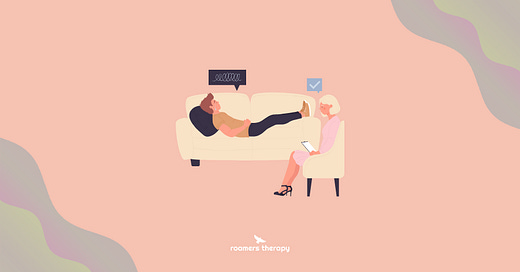Common Myths About Therapists
We have all either heard myths about our therapists or have held myths about them.
Myths about Therapists
We have all either heard myths about our therapists or have held myths about them.
Common myths include beliefs about therapists’ feelings towards clients, thoughts on how therapists utilize their time in session, and opinions on therapists’ knowledge and expertise on certain topics.
While many of these myths are commonly shared, they can dehumanize therapists and negatively impact the therapeutic relationship.
Myth 1: All Therapists Do Is Talk
Psychotherapy involves a lot of talking, which is why it is also called talk therapy. But, talking in therapy is not the same as talking with a friend or even venting.
In addition to holding space and empathizing with clients, therapists use talking to deliver impactful therapeutic interventions, such as:
Cognitive restructuring
Distress Tolerance
Trauma Desensitization
Emotional Processing
Myth 2: Therapists Are Always Right
Though it may be hard to believe, therapists are not always right. Therapists often get it wrong, too, and that’s okay.
A therapist getting it wrong does not mean they don’t understand or care about you. Everyone makes mistakes, and your therapist is no exception.
Plus, a therapist getting something wrong is an opportunity to provide feedback and strengthen a relationship.
Myth 3: Therapists Have The Answers
Therapists do not have the answers to our problems, though. This is because therapists are experts in their studies, but we are the experts in our lives. No one knows more about ourselves than we do.
Therapists are great resources and allies. They strive to help you find the answers you are looking for.
Myth 4: Therapists Don’t Care About You
A common misconception about therapists is that they see their clients as a job or a paycheck, and they actually do not care about their clients.
This is not true. Therapists spend time getting to know their clients, empathizing with their clients, and holding space for them. Therapists foster these safe relationships with clients because they care about them.
Myth 5: Therapists Have “It” All Figured Out
Many times, we believe that therapists are experts in all things related to mental health -- in the same way we expect doctors to be healthy and law enforcement to be law-abiding.
Like everyone else, therapists are people first, and therapists are not their job. Just because someone is a therapist does not mean their life, health, or relationships are perfect. This doesn’t mean they cannot offer you terrific care. In fact, they might be able to empathize with you better because they understand what it means to be human.
Myth 6: Therapists Are Your Cheerleaders
Therapists are known for validating their clients, but sometimes, people believe all therapists do is validate clients. This is not true. This myth can create biases that may either keep people from seeking therapy or impact the perceptions or expectations people have going into therapy.
While it might be a therapist’s personal style to be more validating than others, therapists might also gently push back, challenge, or even put clients in uncomfortable emotional places to help them reach their personal goals.
Takeaways
There are numerous myths (even more than the ones listed here) that people might hold about therapists.
Whether folks see these myths as positive, negative, or neutral, the reality is that these myths can cause harm to the therapeutic relationship.
These myths can prevent people from seeking the help that they need, engaging in the treatment, trusting their providers, or even leaving an unhelpful relationship with a therapist.
The best way challenge these myths is to ask your therapists questions, share your expectionsabout therapy, and provide your therapist with ongoing feedback.




